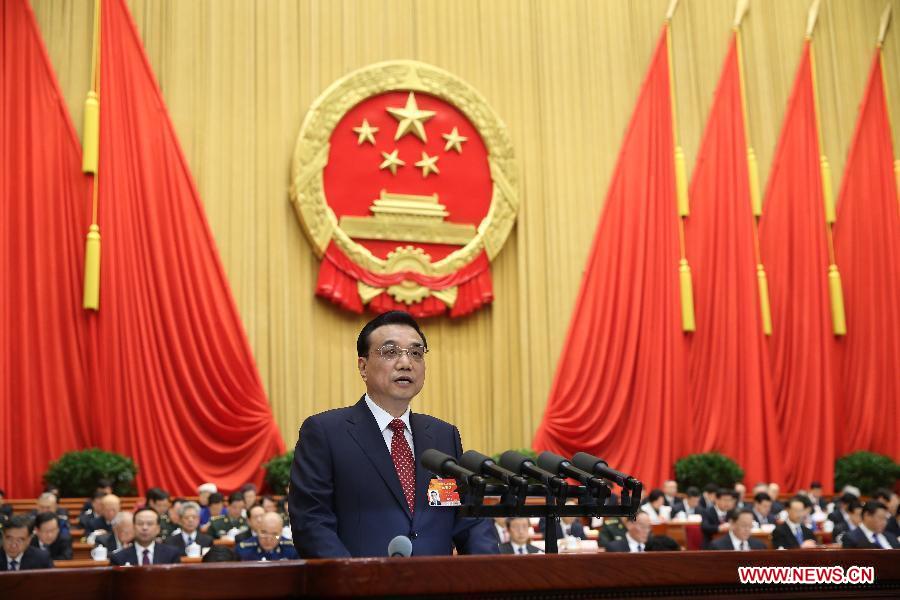

 |
| Chinese Premier Li Keqiang delivers the government work report during the opening meeting of the third session of China's 12th National People's Congress (NPC) at the Great Hall of the People in Beijing, capital of China, March 5, 2015. (Xinhua/Pang Xinglei) |
China to tackle indolence, negligence in administrative duties
Chinese Premier Li Keqiang on Thursday vowed to streamline government and delegate power in a move set to boost market vitality that will redefine the government's role in the economy.
While delivering his annual government work report, Li warned that government power should not be abused, and that Chinese authorities are willing to exchange "less power for more market vitality."[Special coverage]
This means the local government will delegate certain aspects of their power to lower-level governments and to society with simplified administrative procedures.
In a step toward further market reform, the Chinese government plans to sharply cut through excessive bureaucratic procedures for approval.
Observers said the move will see a major adjustment in the government's role in market economy reform which will create a more favorable business environment.
"The government has in the past been heavily involved in foreign investment projects, but the major driving force of a market economy should not come from the government. This needs to be readjusted," Wang Xiaolu, deputy director of the National Economic Research Institute under the China Reform Foundation, told the Global Times.
Wang said Li's initiatives come following the decision reached at the Third Plenary Session of the 18th National Congress of the Communist Party of China that the market itself should play a leading role in resources allocation to maintain a more competitive market.
Currently, before an investment project is officially approved, a company often needs stamps of approval from more than 30 government departments.
Following Li's report, Xu Shaoshi, head of the National Development and Reform Commission (NDRC), said the number of such steps will be reduced to two to three by the end of this year, reported the Xinhua News Agency.
The Chinese government eased investment approval procedure last year by canceling 15 approvals and delegating 23 approvals from central to local government. Alongside reforms in 2013, 76 percent of administrative approvals have been abolished or delegated, Xu said.
A majority of foreign investment projects no longer need approval but registration. Only about 5 percent of foreign investment projects were subject to government approval, Xu said.
The NDRC is negotiating with other departments to realize this reform, he said.
In his Thursday report, Li also warned against the impact brought by some indolent and neglectful local officials in implementing policy set out by the central government, which not only hurt government credibility, but also greatly decreased the efficiency of the reform progress.
It is the first time a Chinese Premier mentioned such a problem in a government work report.
Former Chinese Premier Wen Jiabao in 2010 said in his government work report that officials would be punished for dereliction of duty.
The government will further define the provincial government's role and responsibilities, said Li.
"China's economic growth is largely driven at the local level. A lack of active involvement by the local level government will delay reform," Dong Keyong, Dean of School of Public Administration at the Renmin University of China, told the Global Times.
"As China is restructuring its economy, we need to set clear rules and regulations for both the central and local government to know the bottom lines when implementing their market policy, that they will have to follow market economy laws," Dong noted.
Jiang Ming'an, a law professor at Peking University, said the officials' slothful attitudes reflect the problems that exist in the current cadre system. A more democratic election and appointment system should be adopted so that officials will be held accountable by the voters, Jiang suggested.
Day|Week

 Tsinghua junior makes over 10,000 yuan a day by selling alumnae's used quilts
Tsinghua junior makes over 10,000 yuan a day by selling alumnae's used quilts Graduation photos of students from Zhongnan University
Graduation photos of students from Zhongnan University A school with only one teacher in deep mountains
A school with only one teacher in deep mountains Glimpse of cultural heritage "Xilankapu"
Glimpse of cultural heritage "Xilankapu" Homemade cured hams in SW China
Homemade cured hams in SW China Breathtaking buildings of W. Sichuan Plateau
Breathtaking buildings of W. Sichuan Plateau Graduation photos of "legal beauties"
Graduation photos of "legal beauties" Top 10 most expensive restaurants in Beijing in 2015
Top 10 most expensive restaurants in Beijing in 2015